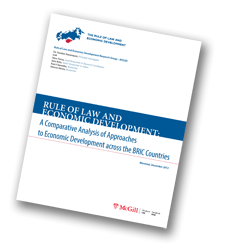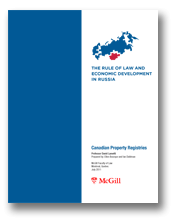
The Rule of Law and Economic Development Research Group (ROLED) engages with cutting-edge issues at the intersection of law and economic development. Our work examines institutional development, corruption, governance and electronic governance, inequality, and access to justice in countries around the world.
Latest news
Join the ROLED alliance!
ROLED is actively seeking to build alliances across borders and continents to work on issues related to rule of law and economic development. We are particularly interested in collaborating with partners from the Global South.
If you are interested in collaborating with ROLED, we would like to hear from you. Please email nandini.ramanujam [at] mcgill.ca with the subject line "Collaboration Proposal” with a brief description of your organization and your primary research interests.
News and publications
Professor Nandini Ramanujam and Francesca Farrington have published "Market-Engaging Institutions: The Rule of Law, Resilience and Responsiveness in an Era of Institutional Flux” (2023) in the Hague Journal on the Rule of Law (2023).
"We propose that market-engaging institutions may form a bridge between the flexibility required by a dynamic market economy and the stability demanded by the rule of law. We define market-engaging institutions as those institutions that facilitate greater political participation for marginalized groups, manage technological disruptions, and support human capital formation. Examples include social partnership agreements, collective bargaining coverage, trade union membership, education and training services, and research and development programmes. We suggest that mobilizing these institutions necessitates credible commitment."
Professor Nandini Ramanujam and Alexander Agnello have published "Repeating the Mistakes of the Law and Development Movement in Afghanistan” (2023) in the Law and Development Review.
"Following the takeover by the Taliban, the small gains made in Afghanistan over the past two decades on the issues of hunger, poverty, health, and education have seen rapid deceleration and require urgent attention. The critiques outlined in this paper, informed by the experience of the Law and Development Movement, are meant to inform, not discourage, global engagement in advancing the human development agenda in Afghanistan and other fragile contexts."
Professor Nandini Ramanujam and Nicholas Caivano have published "Centering Economic Inclusion in Policy for Realizing Disability Rights in India” (2023) in Disability & Society.
"The impact of the coronavirus pandemic on persons with disabilities has laid bare the link between health and economic outcomes. This article reviews the legal and policy framework impacting economic outcomes for persons with disabilities in India against the backdrop of the Sustainable Development Goals (SDGs) on poverty, economic growth, and productive employment. It offers a policy framework for realizing the human rights of persons with disabilities by advancing their inclusion in India’s economic development."
Professor Nandini Ramanujam and Francesca Farrington have published “The Rule of Law, Governance and Development” (2022) in the Handbook on Governance and Development.
"There is growing evidence of a positive relationship between the rule of law and better development outcomes, including increased economic growth, decreased mortality rates, and increased rates of convergence. This chapter problematizes these findings, examining issues with conceptualisation and measurement. The way development bodies conceive the rule of law has evolved with the development agenda, moving through a state-centric phase, to a market-centric phase, to a state and the market approach typified by the Governance agenda. This complex relationship between two evolving concepts - development and the rule of law - has produced mixed approaches and mixed results."
Professor Nandini Ramanujam and Vishakha Wijenayake have published "Crossing the ‘Redline': Engaging Russia in the Multilateral Order” (2022) in Reclaiming Human Rights in a Changing World Order.
"Russia is clamoring to reclaim its influence over its near abroad by using its military might. As of May 2022, tensions between the West and Russia have reached a tipping point following Russia's 'special military operation in Ukraine.’ The unabashed use of force by Russia against one of its neighbors has shifted the international legal and security order, pushing countries such as Finland and Sweden to seek NATO membership. At the domestic level, the increasing crackdown on the opposition, and civil society organizations such as Memorial International, as well as the press and media outlets, leaves no doubt that the Russian regime is blatantly undermining human rights within its borders."
Professor Nandini Ramanujam and Vishakha Wijenayake have published "The Bidirectional Relationship Between Academic Freedom and Rule of Law: Hungary, Poland and Russia (2021) in the Hague Journal of the Rule of Law.
"The paper argues that the relationship between institutional autonomy of universities and the Rule of Law is a mutually reinforcing one, as demonstrated by the situation in Hungary, Poland and Russia. This relationship manifests in two distinct ways. Firstly, the core principles of the Rule of Law are necessary to ensure that university autonomy is not threatened by arbitrary and untrammeled exercise of State power. Secondly, this autonomy, in turn supports and strengthens the Rule of Law. Therefore, to fully appreciate the state of academic freedom in Hungary, Poland and Russia, we need to consider this bidirectional link between institutional autonomy of universities and the Rule of Law."
Report Release: “Rule of Law and Economic Development: A Comparative Approach Towards Sustainable Economic Growth Across the BRICs”
In 2012, the ROLED Research Group authored a comprehensive report on rule of law and economic development in the transition economies. The Group provides an in-depth analysis of the complex and nuanced relationship between rule of law and sustainable economic growth in Brazil, Russia, India, and China, highlighting six lines of inquiry: an introduction to rule of law and economic development; key aspects of governance; the quality of institutions; the judiciary; the prevalence and effects of corruption; and media and civil society organizations.
A comprehensive report on the transition economies
The central work of the group has been an inquiry into rule of law and economic development in the transition economies.
The result is a comprehensive 276-page report, published in 2012: “Rule of Law and Economic Development: A Comparative Approach Towards Sustainable Economic Growth Across the BRICs.” [.pdf]. We invite you to download and read this report.
Six lines of inquiry
Our research aims to provide an in-depth analysis of the complex and nuanced relationship between rule of law and sustainable economic growth in Brazil, Russia, India, and China.
 The report highlights six lines of inquiry:
The report highlights six lines of inquiry:
- an introduction to rule of law and economic development;
- key aspects of governance;
- the quality of institutions;
- the judiciary;
- the prevalence and effects of corruption; and
- media and civil society organizations.
We welcome your comments
We invite you to read this report and provide feedback on its main conclusions. Email: roled.law [at] mcgill.ca.



